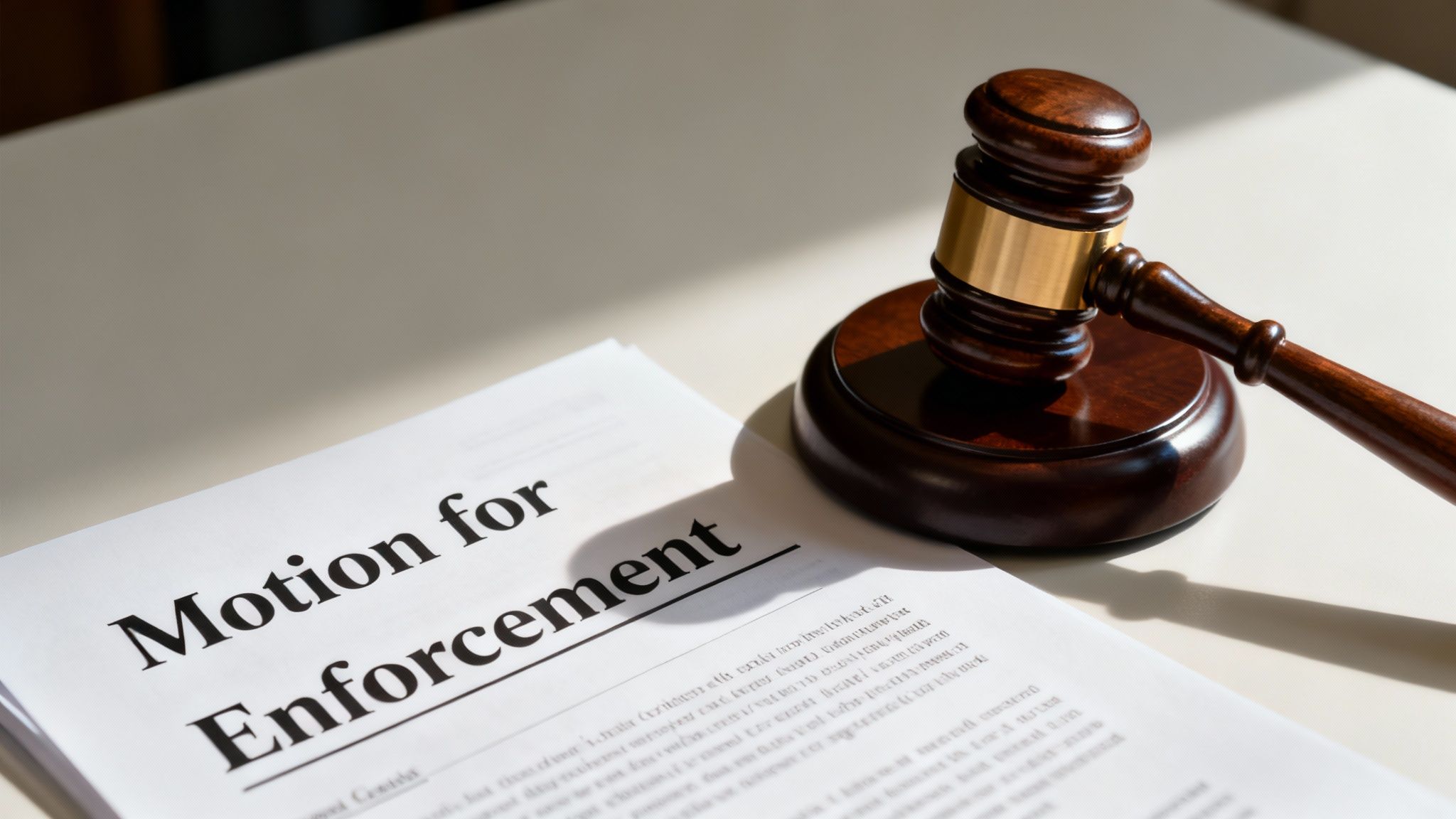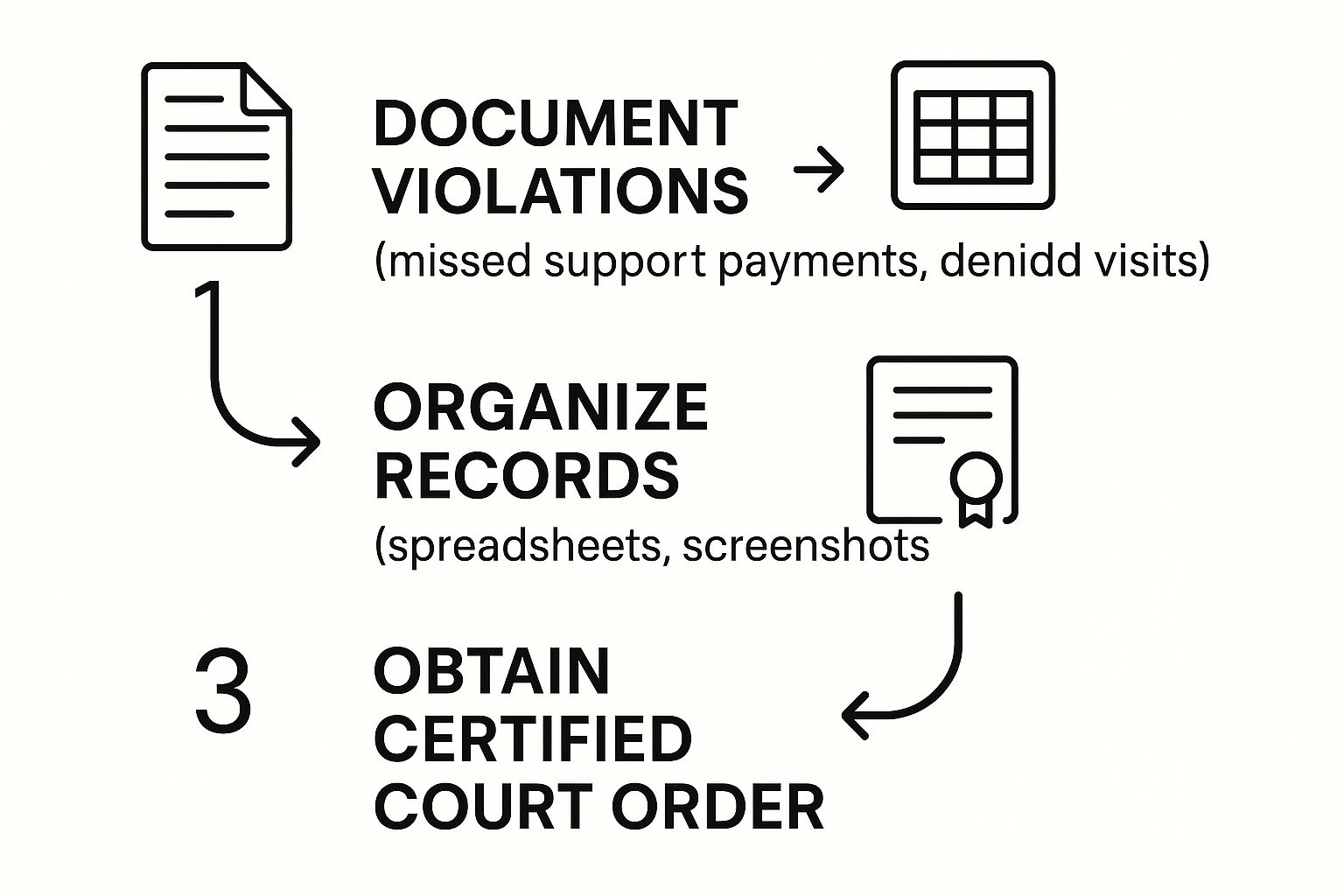When you're dealing with Child Protective Services (CPS), every court order feels like a critical lifeline for your family's future. Whether it’s a possession schedule, a service plan, or an order for child support, you rely on it for stability and predictability during an incredibly stressful time. So, when the other parent or even CPS disregards that order, it’s not just frustrating—it’s terrifying. It can feel like the ground is shifting beneath your feet all over again, leaving you feeling helpless and confused about what to do next.
You are not out of options. The Texas Family Code provides a powerful tool to hold people accountable and restore order when your family’s stability is on the line.
The Other Parent Is Ignoring the Court Order. What Now?

Let's be clear: a Texas court order isn't a suggestion. It is a legally binding command from a judge. When one parent decides to disregard it, they are in direct violation of the law, and this is especially serious in the context of a CPS case where a child’s safety and well-being are paramount.
When polite conversations and text messages go nowhere, it’s time to take formal action. In Texas family law, this means filing a motion for enforcement. This isn't just a complaint; it's a powerful legal request asking a judge to step in, recognize the violation, and compel the other party to comply with the court's decree.
Understanding What You Can Do
Filing a motion for enforcement is your right, and it's about more than just correcting a past wrong. It’s about re-establishing the stability your children desperately need and protecting your parental rights. Here’s what it accomplishes:
- Creates a Legal Record: It officially documents every violation for the court. This paper trail is critical, especially in a CPS case where patterns of non-compliance can influence a judge’s decisions about your child’s future.
- Gets You Specific Results: You can ask the judge for concrete remedies, such as make-up visitation for every weekend you missed or a wage withholding order for unpaid child support.
- Stops Future Problems: A successful enforcement action often includes penalties that make the other parent think twice before ignoring the order again, reinforcing the court's authority.
A Real-Life Scenario: Imagine a mother in a CPS case who has a court order granting her supervised visits with her son every Saturday. For three weeks in a row, the father, who has temporary custody, cancels the visits with last-minute excuses. The mother feels her chance at reunification slipping away. By filing a motion for enforcement, her attorney can present this pattern to the judge. The judge can order immediate make-up visits and admonish the father, warning him of severe consequences if he interferes with the court-ordered reunification process again.
This process is designed to put the structure and predictability back into your children's lives. That court order, especially one created under the watch of CPS, provides a vital framework for safety and consistency. Enforcing it ensures that framework stays intact. You don't have to accept ongoing violations. To better understand how these rights are established, you can learn more about conservatorship in Texas.
Understanding a Motion for Enforcement in Texas

When a Texas family court issues an order—especially during or after a CPS case—that document carries immense weight. It dictates possession, visitation, child support, and required services. When a parent treats it like a suggestion, a motion for enforcement is your legal recourse.
Think of it as the court’s mechanism for holding people accountable. It’s a formal request you file with the court, asking a judge to intervene and compel your co-parent to follow the rules laid out in the order. This action puts the violations directly on the judge's radar and transforms a frustrating personal dispute into a serious legal matter that demands a resolution.
When Is It Time to File for Enforcement?
A motion for enforcement isn't for minor disagreements. The courts expect parents to handle small scheduling conflicts. This tool is for clear, repeated, or significant patterns of non-compliance that undermine the court's plan for your family.
What kind of behavior justifies this step, particularly in a CPS context?
- Consistent Denial of Possession: The other parent repeatedly blocks your court-ordered time with your child, whether it's a supervised visit, a weekend, or a holiday. This is especially damaging when you are trying to complete services and reunify with your child.
- Unpaid Child Support: This includes missed payments, partial payments, or a complete refusal to pay, depriving your child of necessary financial resources.
- Failure to Follow Service Plan Requirements: If the court order requires the other parent to attend counseling or drug testing and they refuse, it could jeopardize the safety plan for the child.
- Violating a Geographic Restriction: The primary parent moves with the child outside the county specified in your order without court permission, disrupting the child's stability and your access to them.
Any party to the original order who has been harmed by the violations can file. This is usually a parent, but it could also be another legal guardian. The person filing is the "movant," and the parent accused of violating the order is the "respondent."
What Can a Judge Actually Do?
When you file a motion for enforcement, you are asking for specific actions to fix the problem. Texas judges have significant power to make things right, particularly when a child's welfare is at stake.
The real goal of an enforcement action is twofold: correct the past wrongs and make sure they don't happen again. A judge can order immediate relief, like make-up weekends for missed visitation, but they can also put long-term solutions in place, like a wage withholding order to guarantee future child support payments.
Let's say your ex has denied you five of your scheduled weekends. A judge could grant you five "make-up" weekends and order your ex to pay for the attorney's fees you incurred. The remedies are designed to fit the specific violation and reinforce the importance of the court’s order.
Understanding your parental rights is key. It's helpful to have a solid grasp of conservatorship in Texas, as this forms the basis of your parenting plan and what the court can enforce.
Common Violations and Potential Court Ordered Remedies
Here’s a breakdown of common scenarios and the remedies a judge might order, particularly relevant to families navigating CPS issues.
| Violation Type | Example Scenario | Potential Court Ordered Remedy |
|---|---|---|
| Child Support Non-Payment | The other parent is $5,000 behind on child support, causing financial hardship while you are trying to maintain a stable home for your children. | The judge can order a lump-sum payment, set up a payment plan for the arrears, garnish wages, or even suspend their driver's and professional licenses. |
| Denial of Visitation | The primary parent consistently finds excuses to deny the non-primary parent their court-ordered supervised visits, hindering progress toward reunification. | The court can order make-up visitation, clarify the exchange process, and issue a stern warning that interfering with reunification efforts could lead to a change in custody. |
| Failure to Return Child | The other parent keeps the child for two extra days after their summer possession period ends, violating the court-ordered schedule. | A judge can issue an immediate order for the child's return (a writ of habeas corpus) and force the violating parent to pay all legal fees. |
| Non-Payment of Medical Bills | A parent refuses to pay their 50% share of a child's $1,200 bill for therapy services required by the CPS service plan. | The court can issue a judgment for the amount owed plus interest, and order the non-paying parent to reimburse you for your attorney's fees. |
Ultimately, a Motion for Enforcement is your tool to hold your co-parent accountable and reaffirm that a court order is not optional—it is the law, designed to protect your child.
How to Build a Strong Case for Your Motion
A successful motion for enforcement is won long before you step into the courtroom. The strength of your case depends entirely on your evidence. Before you can ask a judge to act, you must be prepared to show them—clearly and factually—exactly how the other parent violated the court's order.
This preparation phase is where you take control. By meticulously gathering and organizing your proof, you transform emotional frustration into a compelling legal argument that is difficult for a judge to ignore. This isn’t about telling the judge you’re upset; it's about proving why the court must intervene for the sake of your child.
Document Every Single Violation
First, you need to become a diligent record-keeper. Vague complaints like "He's always late with child support" or "She never lets me have my weekends" carry little weight in court. You need specific, dated instances of non-compliance.
For unpaid child support, create a simple spreadsheet. List the date each payment was due, the amount ordered, the amount you actually received, and a running total of the arrearage. This clean financial history is hard to dispute.
For denied visitation, a detailed journal is essential. For every time your possession was denied or interfered with, write down:
- The date and time of the scheduled visit or exchange.
- How the other parent communicated the denial (text, email, phone call).
- The exact reason they gave for refusing your time.
- The names of anyone who witnessed the attempted exchange.
In a CPS case, this detailed log demonstrates a pattern of behavior that can show the other parent is obstructing the path to reunification. For more tips, review our guide on how to prepare your Texas child custody case.
Gather Your Communication Records
Your text messages, emails, and phone logs are powerful evidence. Often, they capture the violations in the other parent's own words. It is crucial to save and organize these communications so they tell a clear, chronological story.
Take screenshots of every relevant text message exchange. Print out emails showing a refusal to follow the order. Do not delete anything, even if the conversation was difficult. A judge needs the full context to understand what happened.
A Real-Life Scenario: Imagine a father is consistently denied his first weekend of the month. His ex-wife texts him an excuse every time—"The kids have a party," or "They aren't feeling well." By saving screenshots of these texts for three consecutive months, he is no longer just telling the judge about the problem; he is showing a clear, documented pattern of interference.
Secure a Certified Copy of Your Order
This may seem like a small detail, but it is a non-negotiable requirement. You cannot enforce an order without an official copy. You must go to the district clerk's office where your case was heard and request a certified copy of the court order you want to enforce.
A certified copy is stamped by the court clerk, verifying it as a true and correct version of the official document. A simple photocopy will not be accepted by the court. This document is the foundation of your entire motion.
This infographic breaks down the simple, three-step process for gathering your evidence before you file.

The process is straightforward: document the problems, organize your proof, and get your official court order. By taking these steps, you build a solid foundation that dramatically increases your chances of a successful outcome in court.
Navigating the Enforcement Process From Filing to Hearing

You’ve organized your evidence and are ready to take action. Filing a Motion for Enforcement officially turns your personal struggle into a formal legal proceeding. While this can feel intimidating, understanding the steps from drafting the paperwork to standing before a judge can provide the clarity and confidence you need.
The process begins with drafting the motion. This is a formal legal document that demands precision. Simply stating your ex isn't following the rules is not enough. You must detail each violation with specific facts.
Drafting and Filing Your Motion
Your motion must be a clear, factual account of non-compliance. For every violation you claim, you must state three crucial pieces of information:
- The exact date the violation occurred.
- The specific action they took (or failed to take) that violated the order.
- The precise part of the court order that was violated, quoting the section and paragraph number if possible.
This level of detail is required by law. It shows the judge you are serious and makes it difficult for the other parent to offer vague denials. Once drafted, the motion is filed with the district clerk in the same court that issued your original order.
The Importance of Proper Service
After filing, the next critical step is "service." This is the formal legal process of notifying the other parent (the Respondent) that a lawsuit has been filed against them. You cannot simply hand them the paperwork yourself. Strict legal rules must be followed for the case to proceed.
Typically, a constable, sheriff, or private process server will personally deliver a copy of your filed motion and a court-issued "citation." This officially puts the other parent on notice and gives them a deadline to file a response. If they attempt to evade service, a process server has legal methods to complete it.
A common mistake parents make is thinking that filing the motion is enough. Without proper, legally verified service, your case cannot move forward. The court has no power over the other parent until they have been officially served.
Preparing for the Court Hearing
Once the other parent is served, the court will set a hearing date. This is your opportunity to present your case to the judge. Preparation is everything. It will help you present your evidence calmly and effectively, even when emotions are high.
The winning strategy is to stick to the facts, not feelings. While the situation is deeply personal and emotional, a judge is moved by clear, undeniable proof.
Instead of saying, "He's always late," you present your log and state, "Your Honor, on these 12 specific dates, listed in Exhibit A, the Respondent was late for the court-ordered exchange. The delays ranged from 30 minutes to two hours each time."
This fact-based approach makes your argument powerful and establishes your credibility with the judge. Work with your attorney to organize your documents and anticipate questions. This preparation keeps you focused on proving the violations and getting the relief you and your child deserve.
What Happens After the Enforcement Hearing
The moment the judge concludes the hearing can feel like the end of a long, stressful journey. You’ve presented your evidence and are now awaiting a decision. This is where the court not only corrects past wrongs but also works to secure your family's stability moving forward. A Texas judge has a wide range of powerful tools to compel compliance and ensure their orders are respected.
After considering the evidence, the judge will issue a ruling. If they find your co-parent violated the court order, they will grant your motion and order specific remedies. The goal isn't just punishment; it's about fixing the problem and ensuring it doesn't happen again.
Common Remedies a Judge Can Order
The judge’s decision will be tailored to the violations you proved. You won't get a generic slap on the wrist. The court will order concrete actions designed to make you whole and strongly discourage future non-compliance.
Common outcomes include:
- Awarding Make-Up Visitation: For every visit, holiday, or vacation you were wrongfully denied, the judge can order the other parent to provide you with an equal amount of "make-up" time.
- Ordering Payment of Arrears: For unpaid child support, the judge will confirm the total amount owed (the arrearage) and can order a judgment for that amount, often with 6% interest.
- Creating a Strict Payment Plan: The judge can set up a court-ordered payment schedule for the other parent to catch up on what they owe, in addition to their regular monthly support.
- Reimbursing Your Attorney's Fees: Texas law is very clear. If the court finds the other parent violated the order, it has the authority to order them to pay your reasonable attorney’s fees and court costs. This prevents you from being financially penalized for enforcing your rights.
A judge’s primary goal is to get the other parent to follow the rules going forward. These remedies are designed to be effective motivators that protect your child's right to the consistency and predictability laid out in your original court order.
When the Violations Are More Serious
For repeated or flagrant disregard of a court order, judges have much more severe consequences. They view willful non-compliance as a direct challenge to their authority and will act to uphold the integrity of the legal system. To get a broader perspective on potential outcomes, you might find it useful to review information on the punishment for contempt of court.
In these serious situations, a judge can find the non-compliant parent in contempt of court. This opens the door to significant penalties, such as:
- Fines: The court can impose financial penalties for each violation.
- Community Service: The judge might order the parent to complete community service hours.
- License Suspension: For child support violations, a judge can order the suspension of the parent's driver's license, professional licenses, and even hunting and fishing licenses.
- Jail Time: In the most extreme cases of willful disobedience, a judge can sentence the parent to jail for up to 180 days for each violation.
These measures show just how seriously the courts take enforcement, especially when a child's well-being and a family's stability are on the line.
Unpacking Common Questions About Enforcement Motions
Even when you understand the big picture of filing a Motion for Enforcement, many practical questions can arise. Navigating this process is complex, and being prepared for every step can help you feel more confident and in control.
Let's walk through some of the most common questions we hear from Texas parents, especially those involved with CPS.
Can I Get My Attorney’s Fees Covered If I Win?
Yes, this is one of the most important provisions in the law for parents. The Texas Family Code is very direct: if the judge finds the other parent knowingly violated the order, the law gives the judge the power to make them pay your reasonable attorney’s fees and court costs. The court understands that you shouldn't have to bear a financial burden simply to make a co-parent follow the rules that are already in place to protect your child.
How Long Does This Whole Process Take?
There is no single timeline, as each case is unique. How long a motion for enforcement takes depends on a few key factors.
- The Court's Caseload: Some courts are busier than others, which affects how quickly you can get a hearing date.
- The Complexity of Your Case: A straightforward case about missed child support may resolve faster than a complex visitation dispute with dozens of violations.
- If the Other Parent Fights Back: If your ex hires a lawyer and contests the motion, the process will likely take longer.
Generally, you could be looking at anywhere from a few weeks to several months from filing to your final hearing. An experienced family law attorney can provide a more accurate estimate based on your specific court and circumstances.
What if the Other Parent Still Doesn’t Follow the Order?
It is incredibly frustrating when a parent continues to ignore a court order, even after a judge's intervention. However, you are not back at square one. If the violations continue, you have the right to file another Motion for Enforcement.
Courts take repeat offenses very seriously. A second enforcement action for the same issues often leads to much more severe consequences.
The judge’s patience will have worn thin. While they may have been lenient the first time, repeated disobedience is seen as a direct defiance of the court’s authority. This significantly increases the likelihood of stricter penalties, such as higher fines, community service, or even jail time for contempt of court.
If the other parent's ongoing refusal to comply creates instability or harm for your child, it might also become grounds to ask for a modification of the custody order. This is particularly relevant in CPS cases, where demonstrating a parent's inability to follow court orders can impact long-term decisions about conservatorship. It is also important to understand the limits of other agencies, and our guide on whether CPS can override a court order provides crucial context.
Can I File for Enforcement if My Ex Moved Out of State?
Yes, you can. A parent cannot escape their legal obligations by moving across state lines. Texas courts typically retain continuing, exclusive jurisdiction, meaning they have the authority to enforce their own orders regardless of where the other parent lives.
Specific laws, like the Uniform Interstate Family Support Act (UIFSA) for child support, create a clear process for enforcing orders across state lines. However, interstate enforcement is legally complex, requiring coordination between the court systems of two different states. This is a situation where having an experienced attorney is essential to ensure the process is handled correctly.
Facing a co-parent who refuses to follow a court order is a challenge no parent should have to endure alone, especially when your family is under the microscope of CPS. If you are struggling to enforce your rights and protect your child's stability, you have options. The experienced attorneys at the Law Office of Bryan Fagan are here to provide the compassionate and authoritative guidance you need. We understand the fear and confusion that come with these cases and are ready to help you hold the other party accountable. Contact us today for a free, confidential consultation to discuss your case and learn how we can help you and your family move forward with confidence.




